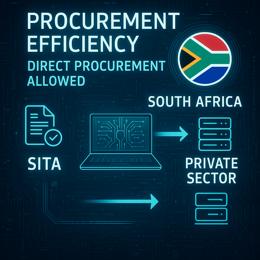Image created by AI
Scandal in Eastern Cape: Hawks Probe Missing Tablets and Alleged Government Corruption
In a significant development that has sent ripples through South Africa's Eastern Cape, the elite police unit known as the Hawks is currently investigating a case involving 47,000 missing tablets originally intended for educational use in local schools. This case not only highlights issues of mismanagement but also deepens the intrigue with alleged corruption at its core involving high-ranking officials.
The origins of the scandal trace back to October 2019 when the Eastern Cape Department of Education entered into a rental agreement with Sizwe Africa, an IT group chaired by Vukile Mehana, for the provision of 55,000 tablets. This contract, initially pegged at R160 million, shockingly escalated to an estimated R537.4 million. The deal, scrutinized by the State Information Technology Agency (SITA), was declared unlawful and invalid, failing to comply with the proper procurement processes which SITA oversees for most governmental agencies.
Public outcry over this deal first gained momentum in July 2020 during a parliamentary committee meeting where it was disclosed that the department would lease rather than purchase the tablets outright—costing approximately 65% more than market price.
Following this disclosure, the Democratic Alliance urged an investigation by the Public Protector into the matter. By October 2020, the High Court had halted the execution of the contract amid growing concerns.
Complicating matters further is the involvement of Dr. Naledi Mbude-Mehana, former head of the Eastern Cape Department of Education and the wife of Vukile Mehana. The Hawks are meticulously examining her role in authorizing payments totaling R330 million to Sizwe Africa shortly before her resignation in May 2024, under a cloud of suspicion and subsequent suspension.
These revelations have not only spotlighted the staggering loss of public funds but also the problematic disappearance of the tablets themselves. By April 2021, it was confirmed that less than 8,000 of the 55,000 tablets were returned by students, leading to massive logistical and accountability issues.
Adding to the department’s woes, the Eastern Cape treasury has also launched a forensic investigation to closely examine the contract’s minutiae, with findings expected to shed further light on the depth of potential financial mismanagement and misconduct.
As of November 2024, the embattled department confirmed the ongoing investigation, emphasizing their cooperation with all statutory bodies involved. This scandal not only exemplifies the challenges of governance in South African education sectors but also highlights the critical need for transparent, accountable management practices to safeguard public resources and trust.










